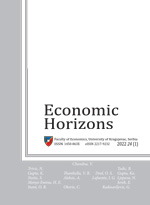INTERACTION BETWEEN FINANCIAL INTERMEDIATION EFFICIENCY AND ECONOMIC GROWTH
Milka Grbic
University of Kragujevac, Faculty of Economics, Kragujevac, The Republic of Serbia
Financial intermediaries have the key role in making a connection between savings and investments. Given the fact that an efficient transfer of savings into investments is made more difficult by transaction and information costs, financial intermediaries are specialized in minimizing the said costs per unit of invested capital. They are also trained to identify productive and innovative investment endeavors which contribute to the growth of real output. Real output growth is the basis for increasing the financial potential, which creates the basis for the development of financial intermediaries. In connection with that, apart from the analysis of the relevant factors making the process of the mobilization and transfer of savings more difficult, the theoretical models that put an emphasis on the relationship between the efficiency of financial intermediation and economic growth are discussed in the paper. The research results are indicative of the fact that the improvement in financial intermediaries’ business doing enables faster economic growth. Simultaneously, the growth of the economic activity increases the scope of the business operations conducted by financial intermediaries. Thanks to the effects of the economies of scale that contribute to a reduction in transaction and information costs, the efficiency of financial intermediations grows.
Keywords: financial intermediation, capital accumulation, productivity, economic growth
JEL Classification: E44, G21, O40
Economic Horizons, 2016, Vol. 18, No 3, pp. 241-254; Published online 30 December 2016; doi:10.5937/ekonhor1603247G




